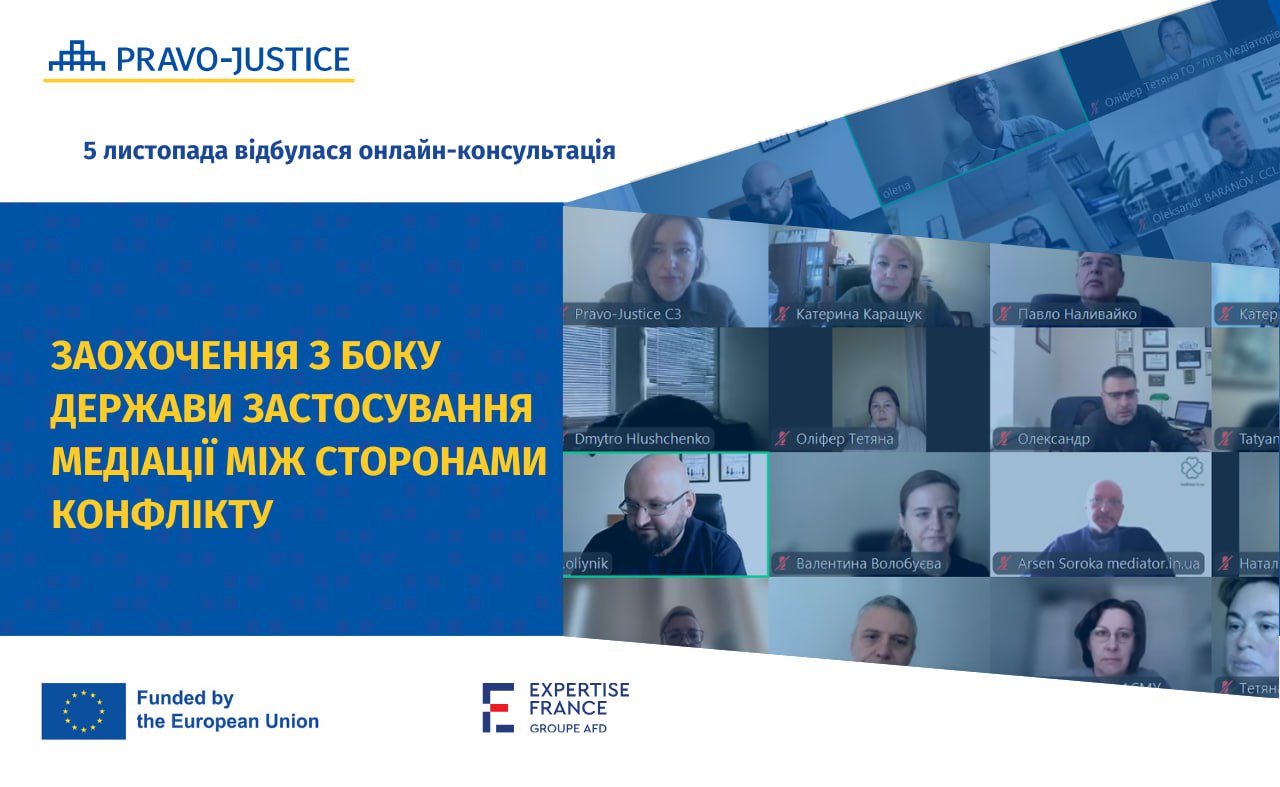In the Framework of Legal Monitoring, There Was a Discussion on the Wider Use of Mediation Between the Parties to the Conflict

On 5 November, the Ministry of Justice of Ukraine, with the support of EU Project Pravo-Justice, held an online consultation ‘How the State can Promote Mediation between the Parties to the Conflict’. Representatives of the Ministry of Justice, the State Property Fund, the Free Legal Aid Centre, Supreme Court justices, mediators and experts of EU Project Pravo-Justice participated in the discussion.
‘Ukraine is currently screening its legislation to check whether it complies with EU law. The European Commission takes an interest, among other things, in applying mediation. That is why the Ministry of Justice is studying the experience of other European countries and stakeholders’ ideas, proposals and visions on how the state can facilitate mediation and promote it,’ said Oleksandr Oliinyk, Director of the Directorate of Justice and Criminal Justice of the Ministry of Justice of Ukraine.
Katilin Popov, international expert of EU Project Pravo-Justice and a private enforcement officer from Bulgaria, presented European trends in mediation, particularly how it is applied and whether it proves efficient in enforcement proceedings. He said that the procedural codes of all EU Member States allow (and some even oblige) the parties to the conflict to participate in mediation procedures.
‘In the Czech Republic and Bulgaria, judges must offer to use mediator’s services to resolve a dispute. In Lithuania and Luxembourg, this obligation depends on the category of a case. Many countries oblige lawyers to inform about an opportunity to use mediation,’ said Katilin Popov. ‘There are even certain tools to encourage recourse to mediation, such as reducing court fees or other legal costs payable by the parties to the dispute. Conversely, refusal to participate in mediation procedures may result in the imposition of fines.’ He also added that, when referring a dispute to mediation, it is crucial to make sure that the parties try to settle their dispute out of court and do not resort to mediation to avoid fulfilling their obligations or protracting the proceedings.
Luiza Romanadze, expert of EU Project Pravo-Justice and President of the Ukrainian Academy of Mediation, spoke about steps required to establish mandatory mediation in Ukraine in certain categories of disputes.
‘Mandatory mediation in certain categories of disputes in Ukraine will be successful only if implemented gradually and a balance between voluntary and compulsory mediation is maintained. When we introduce something mandatory, it should be based on a well-developed and voluntary foundation. We should make sure that it is accessible, high-quality and informed,’ the expert said.
According to her, to minimise possible risks when introducing mandatory mediation information and assessment meetings (MIAMs), it is essential to proactively ensure their geographical accessibility and affordability for vulnerable groups. It is also important to provide information materials for the parties to the dispute on Internet resources and on the premises of public authorities.
‘Mandatory MIAMs should be supported by amendments to procedural codes and other legal acts. The legislative framework should provide exceptions to the general requirements regarding mandatory MIAMs in certain categories of disputes. It is advisable to study other countries’ experience regarding the effectiveness of financial incentives aimed at encouraging the parties to participate in MIAMs (e.g., by obliging the party that evaded a mandatory MIAM to pay legal costs),’ said Luiza Romanadze.
Olena Bilokon, a justice of the Supreme Court, outlined how courts can inform litigants about mediation. She emphasised that judges should be aware that mediation is an alternative means of conflict resolution that is quite efficient.
Tetiana Prylutska, Deputy Head of the Regional Office of the State Property Fund of Ukraine in Rivne and Zhytomyr regions, spoke about the obstacles encountered in using mediation as an alternative way to resolve conflicts in the public sector of the economy.
‘Neither the Civil Code, nor the Commercial Code, nor the legislation on privatisation and lease relations list mediation as a procedure to resolve any conflict or dispute. If there is a dispute, the legislator obliges us to recourse to either negotiations or litigation. However, many investors who have become a party to a dispute prefer to resolve their conflicts through mediation,’ said Tetiana Prylutska. She believes that recourse to mediation will reduce the number of court proceedings and complaints to law enforcement agencies while improving the reputation of public authorities and the country as a whole.
Oleksandr Baranov, Director of the Coordination Centre for Legal Aid Provision, spoke about the role of the FLA system in giving people access to mediation.